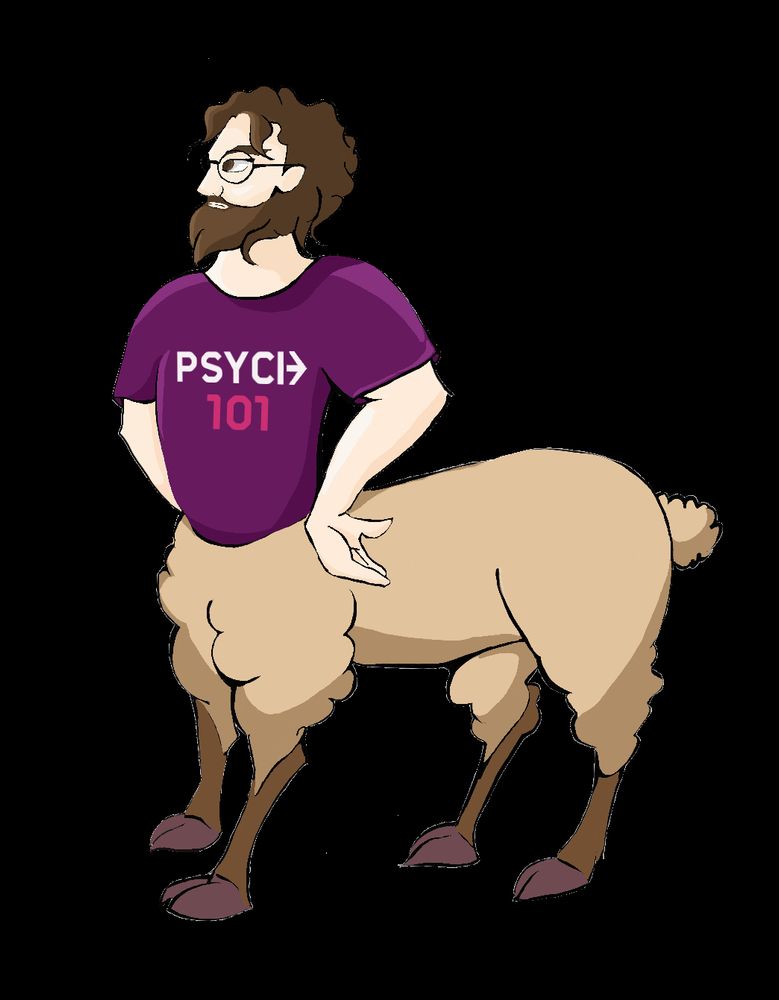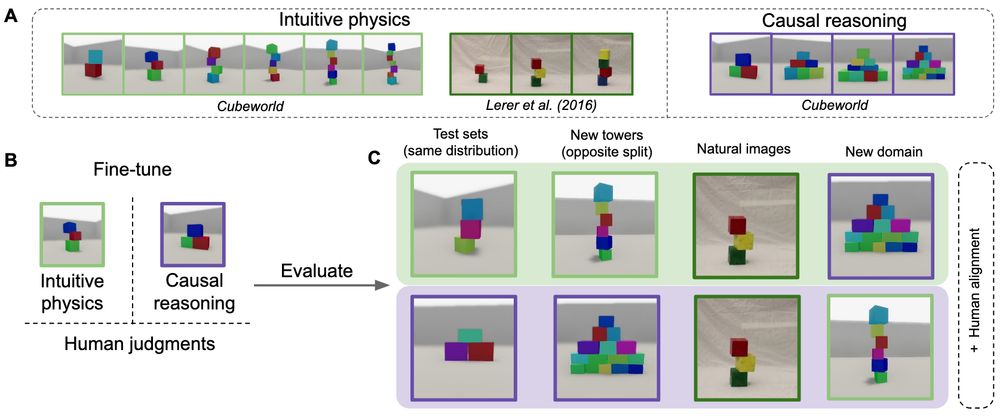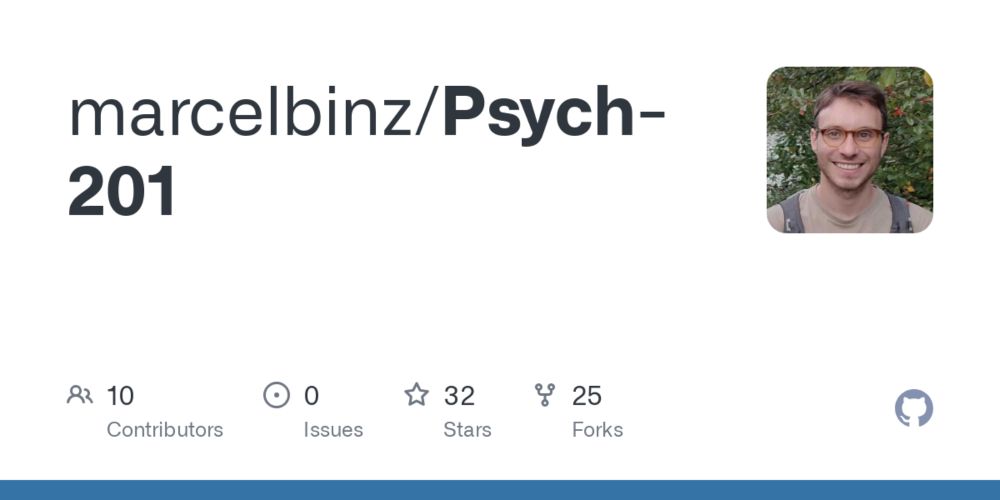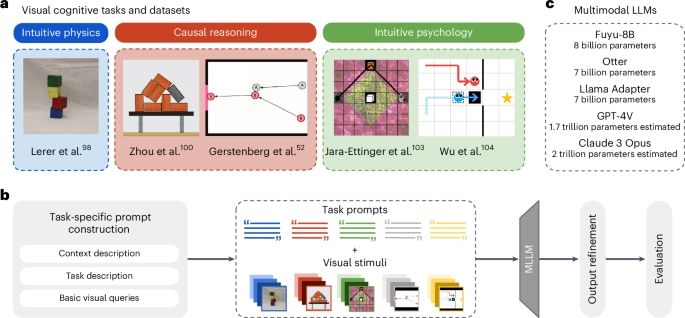
Marcel Binz
@marcelbinz.bsky.social
Natural and artificial general intelligence.
https://marcelbinz.github.io/
https://marcelbinz.github.io/
join us!
🚀 We are hiring! 🚀
🔍 Join us as a Postdoctoral Researcher (fully-funded) at the Helmholtz Institute for Human-Centered AI in Munich.
🔍 Join us as a Postdoctoral Researcher (fully-funded) at the Helmholtz Institute for Human-Centered AI in Munich.

November 3, 2025 at 10:42 AM
join us!
We are organizing a workshop on Metacognition in Generative AI at @euripsconf.bsky.social in Copenhagen later this year.
Submission deadline for short papers is on October 17th.
Submission deadline for short papers is on October 17th.
October 1, 2025 at 12:36 AM
We are organizing a workshop on Metacognition in Generative AI at @euripsconf.bsky.social in Copenhagen later this year.
Submission deadline for short papers is on October 17th.
Submission deadline for short papers is on October 17th.
check out our GAC on benchmarks at CCN happening later today!
Our #CCN2025 GAC debate w/ @gretatuckute.bsky.social, Gemma Roig (www.cvai.cs.uni-frankfurt.de), Jacqueline Gottlieb (gottlieblab.com), Klaus Oberauer, @mschrimpf.bsky.social & @brittawestner.bsky.social asks:
📊 What benchmarks are useful for cognitive science? 💭
2025.ccneuro.org/gac
📊 What benchmarks are useful for cognitive science? 💭
2025.ccneuro.org/gac

August 13, 2025 at 9:34 AM
check out our GAC on benchmarks at CCN happening later today!
Reposted by Marcel Binz
What happens when you train AI on psychological experiments? It behaves a lot like a human mind. Here's my story on Centaur, and the debate about what AI has to offer to cognitive science. Gift link nyti.ms/3ZYqXcg 🧪

Scientist Use A.I. To Mimic the Mind, Warts and All
To better understand human cognition, scientists trained a large language model on 10 million psychology experiment questions. It now answers questions much like we do.
nyti.ms
July 2, 2025 at 3:23 PM
What happens when you train AI on psychological experiments? It behaves a lot like a human mind. Here's my story on Centaur, and the debate about what AI has to offer to cognitive science. Gift link nyti.ms/3ZYqXcg 🧪
Excited to see our Centaur project out in @nature.com.
TL;DR: Centaur is a computational model that predicts and simulates human behavior for any experiment described in natural language.
TL;DR: Centaur is a computational model that predicts and simulates human behavior for any experiment described in natural language.

July 2, 2025 at 3:34 PM
Excited to see our Centaur project out in @nature.com.
TL;DR: Centaur is a computational model that predicts and simulates human behavior for any experiment described in natural language.
TL;DR: Centaur is a computational model that predicts and simulates human behavior for any experiment described in natural language.
New short-form preprint in which we use Centaur to identify gaps in interpretable cognitive models and revise them accordingly using Qwen3 -- fully automated and without a human-in-the-loop.
arxiv.org/abs/2505.17661
arxiv.org/abs/2505.17661

Automated scientific minimization of regret
We introduce automated scientific minimization of regret (ASMR) -- a framework for automated computational cognitive science. Building on the principles of scientific regret minimization, ASMR leverag...
arxiv.org
June 1, 2025 at 11:32 AM
New short-form preprint in which we use Centaur to identify gaps in interpretable cognitive models and revise them accordingly using Qwen3 -- fully automated and without a human-in-the-loop.
arxiv.org/abs/2505.17661
arxiv.org/abs/2505.17661
Reposted by Marcel Binz
Registration for IICCSSS 2025 in Darmstadt is open! 🥳 Sign up now for a week of exciting talks, hands-on projects and inspiring discussions! www.iiccsss.org/registration/
As always, IICCSSS is free, and open to all students who are excited about computational cognitive science 💡🧠
As always, IICCSSS is free, and open to all students who are excited about computational cognitive science 💡🧠
registration | IICCSSS
International Interdisciplinary Computational Cognitive Science Summer School
www.iiccsss.org
May 9, 2025 at 8:25 PM
Registration for IICCSSS 2025 in Darmstadt is open! 🥳 Sign up now for a week of exciting talks, hands-on projects and inspiring discussions! www.iiccsss.org/registration/
As always, IICCSSS is free, and open to all students who are excited about computational cognitive science 💡🧠
As always, IICCSSS is free, and open to all students who are excited about computational cognitive science 💡🧠
Reposted by Marcel Binz
#AIinScience: Ethical & Practical Challenges
🎤Interview with Dr. Marcel Binz, #HelmholtzMunich, on how Large Language Models are transforming scientific methods & the need of reshaping the scientific mindset:
👉 t1p.de/p82vj
@marcelbinz.bsky.social @ericschulz.bsky.social @zeynepakata.bsky.social
🎤Interview with Dr. Marcel Binz, #HelmholtzMunich, on how Large Language Models are transforming scientific methods & the need of reshaping the scientific mindset:
👉 t1p.de/p82vj
@marcelbinz.bsky.social @ericschulz.bsky.social @zeynepakata.bsky.social
April 24, 2025 at 9:16 AM
#AIinScience: Ethical & Practical Challenges
🎤Interview with Dr. Marcel Binz, #HelmholtzMunich, on how Large Language Models are transforming scientific methods & the need of reshaping the scientific mindset:
👉 t1p.de/p82vj
@marcelbinz.bsky.social @ericschulz.bsky.social @zeynepakata.bsky.social
🎤Interview with Dr. Marcel Binz, #HelmholtzMunich, on how Large Language Models are transforming scientific methods & the need of reshaping the scientific mindset:
👉 t1p.de/p82vj
@marcelbinz.bsky.social @ericschulz.bsky.social @zeynepakata.bsky.social
We are looking for two PhD students at our institute in Munich.
Both postions are open-topic, so anything between cognitive science and machine learning is possible.
More information: hcai-munich.com/PhDHCAI.pdf
Feel free to share broadly!
Both postions are open-topic, so anything between cognitive science and machine learning is possible.
More information: hcai-munich.com/PhDHCAI.pdf
Feel free to share broadly!
hcai-munich.com
April 9, 2025 at 12:11 PM
We are looking for two PhD students at our institute in Munich.
Both postions are open-topic, so anything between cognitive science and machine learning is possible.
More information: hcai-munich.com/PhDHCAI.pdf
Feel free to share broadly!
Both postions are open-topic, so anything between cognitive science and machine learning is possible.
More information: hcai-munich.com/PhDHCAI.pdf
Feel free to share broadly!
Reposted by Marcel Binz
Ever wondered why only some memories 🧠 come easily? Our latest work (osf.io/preprints/ps...) led by S. Haridi, with @ericschulz.bsky.social, shows that targeted memory retrieval speeds up with precise semantic and temporal retrieval cues. Hence, crafting cues can give you instant access to memories⚡

February 3, 2025 at 1:41 PM
Ever wondered why only some memories 🧠 come easily? Our latest work (osf.io/preprints/ps...) led by S. Haridi, with @ericschulz.bsky.social, shows that targeted memory retrieval speeds up with precise semantic and temporal retrieval cues. Hence, crafting cues can give you instant access to memories⚡
Reposted by Marcel Binz
In previous work we found that VLMs fall short of human visual cognition. To make them better, we fine-tuned them on visual cognition tasks. We find that while this improves performance on the fine-tuning task, it does not lead to models that generalize to other related tasks:

February 25, 2025 at 10:45 AM
In previous work we found that VLMs fall short of human visual cognition. To make them better, we fine-tuned them on visual cognition tasks. We find that while this improves performance on the fine-tuning task, it does not lead to models that generalize to other related tasks:
Reposted by Marcel Binz
About a month late posting this, but here's a new project with @ericschulz.bsky.social, @akjagadish.bsky.social, @marvinmathony.bsky.social and Tobias Ludwig
We are using LLMs to propose cognitive models in learning and decision making data. Presenting this work at RLDM!
arxiv.org/abs/2502.00879
We are using LLMs to propose cognitive models in learning and decision making data. Presenting this work at RLDM!
arxiv.org/abs/2502.00879

Towards Automation of Cognitive Modeling using Large Language Models
Computational cognitive models, which formalize theories of cognition, enable researchers to quantify cognitive processes and arbitrate between competing theories by fitting models to behavioral data....
arxiv.org
February 26, 2025 at 10:08 AM
About a month late posting this, but here's a new project with @ericschulz.bsky.social, @akjagadish.bsky.social, @marvinmathony.bsky.social and Tobias Ludwig
We are using LLMs to propose cognitive models in learning and decision making data. Presenting this work at RLDM!
arxiv.org/abs/2502.00879
We are using LLMs to propose cognitive models in learning and decision making data. Presenting this work at RLDM!
arxiv.org/abs/2502.00879
The German Cognitive Science Society is organizing a PhD symposium in Tuebingen in April.
If you are a PhD student in the vicinity, you should definetely register (by February 28th) -- it will be fun!
cogsciprag.github.io/context-in-c...
If you are a PhD student in the vicinity, you should definetely register (by February 28th) -- it will be fun!
cogsciprag.github.io/context-in-c...
Participate
Website for CogSci PhD symposium in Tübingen in 2025 on the topic “Understanding context in cognition”, funded by the German Cognitive Science society
cogsciprag.github.io
February 7, 2025 at 3:24 PM
The German Cognitive Science Society is organizing a PhD symposium in Tuebingen in April.
If you are a PhD student in the vicinity, you should definetely register (by February 28th) -- it will be fun!
cogsciprag.github.io/context-in-c...
If you are a PhD student in the vicinity, you should definetely register (by February 28th) -- it will be fun!
cogsciprag.github.io/context-in-c...
Reposted by Marcel Binz
In our latest article, published in @pnas.org and led by @marcelbinz.bsky.social and Stephan Alaniz, we got together four diverse groups of scientists to reflect on how LLMs should affect science. From treating them like co-authors to using other tools instead, many interesting arguments emerged.

January 29, 2025 at 9:11 AM
In our latest article, published in @pnas.org and led by @marcelbinz.bsky.social and Stephan Alaniz, we got together four diverse groups of scientists to reflect on how LLMs should affect science. From treating them like co-authors to using other tools instead, many interesting arguments emerged.
We are currently building the largest, cross-domain data set of human behavior as part of an open collaborative project. Contributions of any form are welcome, but especially experiments with meta-data from developmental, cross-cultural, or clinical studies.
More details: github.com/marcelbinz/P...
More details: github.com/marcelbinz/P...

GitHub - marcelbinz/Psych-201
Contribute to marcelbinz/Psych-201 development by creating an account on GitHub.
github.com
January 27, 2025 at 12:43 PM
We are currently building the largest, cross-domain data set of human behavior as part of an open collaborative project. Contributions of any form are welcome, but especially experiments with meta-data from developmental, cross-cultural, or clinical studies.
More details: github.com/marcelbinz/P...
More details: github.com/marcelbinz/P...
Reposted by Marcel Binz
Have we built machines that learn and think like people?
In our new paper, we find that vision large language models still fall short when it comes to cognitive abilities in the domains of causal reasoning, intuitive physics, and theory of mind.
www.nature.com/articles/s42...
In our new paper, we find that vision large language models still fall short when it comes to cognitive abilities in the domains of causal reasoning, intuitive physics, and theory of mind.
www.nature.com/articles/s42...

Visual cognition in multimodal large language models - Nature Machine Intelligence
Modern vision-based language models face challenges with complex physical interactions, causal reasoning and intuitive psychology. Schulze Buschoff and colleagues demonstrate that while some models ex...
www.nature.com
January 15, 2025 at 11:50 AM
Have we built machines that learn and think like people?
In our new paper, we find that vision large language models still fall short when it comes to cognitive abilities in the domains of causal reasoning, intuitive physics, and theory of mind.
www.nature.com/articles/s42...
In our new paper, we find that vision large language models still fall short when it comes to cognitive abilities in the domains of causal reasoning, intuitive physics, and theory of mind.
www.nature.com/articles/s42...
Reposted by Marcel Binz
and mark in your calendars the following dates & speakers:
David Danks, Jan. 7
Dimitri Coelho Mollo, Jan 14
Raphael Milliere, Jan 21
Ben Bergen, Feb 4
David Garcia, Feb 18
Jay McClelland, Mar 4
Chris Summerfield, Mar 18
Marcel Binz, April 1st
Tom Griffiths, April 29
Thomas Icard, May 13
David Danks, Jan. 7
Dimitri Coelho Mollo, Jan 14
Raphael Milliere, Jan 21
Ben Bergen, Feb 4
David Garcia, Feb 18
Jay McClelland, Mar 4
Chris Summerfield, Mar 18
Marcel Binz, April 1st
Tom Griffiths, April 29
Thomas Icard, May 13
Seminar Series – Centre for Cognition, Computation and Modelling
psyc.bbk.ac.uk
December 17, 2024 at 9:39 AM
and mark in your calendars the following dates & speakers:
David Danks, Jan. 7
Dimitri Coelho Mollo, Jan 14
Raphael Milliere, Jan 21
Ben Bergen, Feb 4
David Garcia, Feb 18
Jay McClelland, Mar 4
Chris Summerfield, Mar 18
Marcel Binz, April 1st
Tom Griffiths, April 29
Thomas Icard, May 13
David Danks, Jan. 7
Dimitri Coelho Mollo, Jan 14
Raphael Milliere, Jan 21
Ben Bergen, Feb 4
David Garcia, Feb 18
Jay McClelland, Mar 4
Chris Summerfield, Mar 18
Marcel Binz, April 1st
Tom Griffiths, April 29
Thomas Icard, May 13
Reposted by Marcel Binz
Preprint alert! We explore 3 exploration tasks, testing if they measure a stable construct & its link to real-world exploration. We find improved robustness of latent factors compared to single-task estimates.
With Mirko Thalmann & @ericschulz.bsky.social
🔗https://osf.io/preprints/psyarxiv/tzuey
With Mirko Thalmann & @ericschulz.bsky.social
🔗https://osf.io/preprints/psyarxiv/tzuey
December 10, 2024 at 9:21 AM
Preprint alert! We explore 3 exploration tasks, testing if they measure a stable construct & its link to real-world exploration. We find improved robustness of latent factors compared to single-task estimates.
With Mirko Thalmann & @ericschulz.bsky.social
🔗https://osf.io/preprints/psyarxiv/tzuey
With Mirko Thalmann & @ericschulz.bsky.social
🔗https://osf.io/preprints/psyarxiv/tzuey
If you are at NeurIPS, and interested in human alignment, representations, or cognitive modeling, don't miss out Can's Poster tomorrow!
Alignment is more than comparing similarity judgments! How well do pretrained neural networks align with humans in few-shot learning settings? Come check our poster #3904 at #NeurIPS on Wednesday to find out

December 10, 2024 at 3:44 PM
If you are at NeurIPS, and interested in human alignment, representations, or cognitive modeling, don't miss out Can's Poster tomorrow!

